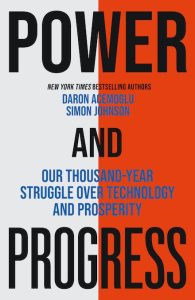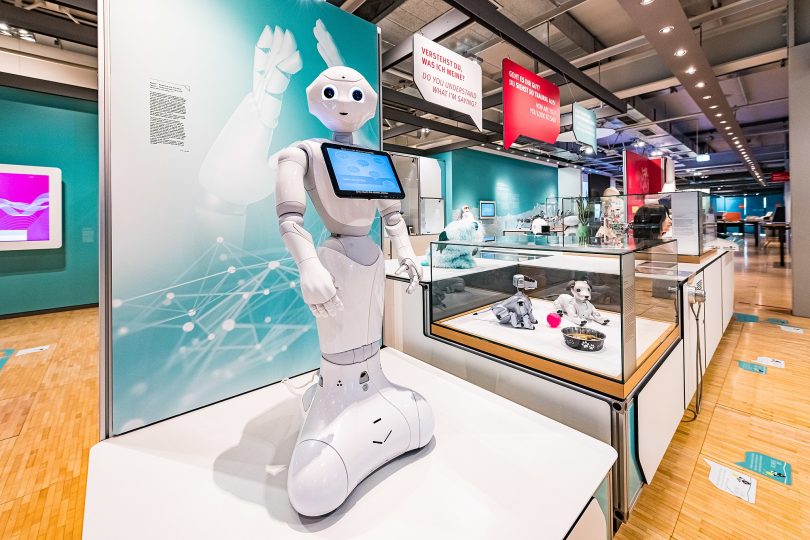 In Power and Progress: Our Thousand-Year Struggle Over Technology and Prosperity, Daron Acemoglu and Simon Johnson (A&J) argue that the unyielding belief that technological progress will always reduce human suffering and enable human flourishing is wrong. Whereas the allure of “progress” has long wooed business leaders and economists, this point of view has led society to a dark place many times throughout history. They provide the reader with ample examples throughout the 18th and 19th centuries where new technologies entrenched human suffering, and make the case that history is repeating itself in modern times.
In Power and Progress: Our Thousand-Year Struggle Over Technology and Prosperity, Daron Acemoglu and Simon Johnson (A&J) argue that the unyielding belief that technological progress will always reduce human suffering and enable human flourishing is wrong. Whereas the allure of “progress” has long wooed business leaders and economists, this point of view has led society to a dark place many times throughout history. They provide the reader with ample examples throughout the 18th and 19th centuries where new technologies entrenched human suffering, and make the case that history is repeating itself in modern times.
A&J argue this blind techno-optimism, which ignores the lessons of the past, is pervasive throughout our politics and culture. Overly confident technologists woo ordinary citizens, politicians and journalists to adopt new technologies, even when those new technologies fail to consider the broader interests of society. It is only after new technologies are implemented that the societal costs become clear. If we are to steer society in a better direction, the authors argue, we must first adopt a new, more critical narrative around technology.
A&J make their case by pointing to many historical examples of business leaders and their “innovations” that have increased suffering. One example is Ferdinand de Lesseps, a French diplomat who failed in his attempt to build the Panama Canal in the late 19th century. Lesseps, who had successfully developed the Suez Canal, was headstrong in his vision of connecting the Atlantic and Pacific oceans. His confidence led others to buy into his vision, despite the rugged and dangerous conditions in which he was operating. Ultimately, the project failed on his watch with many workers injured or killed. Lesseps marched many to catastrophe through his blind optimism; A&J contend our current crop of technologists are doing the same.
There is no doubt the authors’ argument is timely given recent technological developments. The book was released shortly after the rise of new artificial intelligence (AI) tools sent shockwaves throughout society, as generative AI tools like ChatGPT, Google’s Bard, and Microsoft’s Bing were released to the public. You only need to spend a few minutes conversing with ChatGPT to see how disruptive this technology is – and is likely to be – to education, computer programming, journalism, the arts, and just about every other facet of human life. It appears we’ve turned a technological corner where it has become extremely difficult to predict what the next five to ten years will look like.
But is techno-optimism the right problem to solve? A&J fall short in making their case for this. While it is easy to point to instances of hubris among Silicon Valley entrepreneurs, it is hardly true that these leaders are as blindly optimistic as A&J claim. In fact, many have been the most vocal in identifying possible negative outcomes of their technologies even before the recent generative AI releases. Just consider Bill Gates’ 2015 warning about AI being used by criminals, Elon Musk’s 2020 argument that it threatens the very existence of humans, or the expression of guilt in 2017 from Chamath Palihapitiya, the former Facebook executive and investor, for creating “tools that are ripping apart the social fabric of how society works”.
Even the most optimistic tech leaders would have a difficult time selling their narrative in recent years. Ordinary voters, journalists and politicians are equally sceptical of what happens in Silicon Valley. A recent Brookings Institution poll found that Americans’ trust in institutions fell across the board from 2018 to 2021, with the drop being the sharpest for big tech companies. Though there are no polls on the views of journalists alone, they appear to be no different. A scan of today’s news articles on the subject shows that they are not all positive by any means. Politicians have responded in turn, with the last two US presidents zeroing in on antitrust enforcement, among many other issues, in the tech sector.
Zooming out even further, there is also the question whether technology is entirely deserving of the blame A&J place upon it in the first place. A&J devote many pages to arguing technology is responsible for much of the rise in income inequality in the US. Though technology has influenced the trajectory of American inequality, and will likely continue to do so, social scientists have pointed to more factors than technology to explain the gap between the rich and the poor. Changes in public policy, the rise of globalisation, shifts in norms, and the “superstar hypothesis” are just a few other explanations. It should also be mentioned that inequality was increasing well before any of the biggest technology companies of our day were founded. Overemphasising the relationship between technology and inequality leaves out other important variables and may limit how we think about policy prescriptions.
All this is not to say A&J are wrong to raise concern. It is very possible that government, which has often been designed to be slow to act, is wholly unprepared for technologies that move so fast. This is not to mention the polarised political environment which makes legislating all the more difficult. Yet effective policy should not take innovation for granted. Nor should it be based on simplistic stories that point fingers or misdiagnose problems. This is especially true of policies that attempt to steer innovation in one direction or another. After all, while technology may have introduced many of humanity’s problems in the past, present and future, it is also the reason why much of humanity has escaped from poverty.
Overall, Power and Progress offers a unique history of the way technological progress has affected humanity. Whether the reader is a dyed-in-the-wool economist or a casual reader, he or she will learn from the many historical anecdotes that show how technology has actually increased human suffering in some instances. These are anecdotes that have, for the most part, not figured in history and economics textbooks. Nevertheless, readers should be wary of the simplistic narrative that binds these anecdotes together. Not only are simple narratives false, they can also lead us down paths that make us all worse off.



Great review, Matt, although you convinced me not to read it. And a hearty congratulations on graduating and on the new job back home. Sorry I missed it all, and hope all is well.
Thank you, Ryan! I really appreciate that… The book has some great history, it’s the narrative I couldn’t quite buy into… Hope all is well in Canberra. Let’s stay in touch.